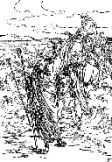1 Samuel
Fugitive on the Run
20:1 - 21:23
Psalm 34:19
Many are the afflictions of the righteous: but the LORD delivereth him out of them all.
KJV
related reading
Psalm 34
Psalm 56
Proverbs 15:29 - 16:9
2 Corinthians 4:1 - 11
Hebrews 12:1-15
A New York Court of Appeals decided against a plaintiff in an action for damages. A man who was walking along Fourth Avenue stopped on a temporary bridge to watch some work being done on the subway. A workman advised him to move on, as he was liable to get hurt. The man refused, claiming he had a right to be on a public street. A few minutes later he was struck on the head by a piece of iron from a pipe high above. He was severely hurt. He sued for damages.
The court decided that he was perfectly justified in staying where he was hurt after being warned. However, the warning he had received and had not heeded removed any further obligation on the part of the company. The court explained further that the contractor had no right to remove the man by force. Said contractor had performed his full duty by warning of the peril.
How often do we create our own problems? Before God, most of our problems are self-destruct actions. God has set the rules before us, and even when we know the rules, we still, somehow, someway, manage to break them. It seems to be buried in our nature. Clearly, it is the way of the Satan’s empire, the world system. Even when it is not broken, we need to tinker with it, to “fix” it, to make it better. What’s the advertising slogan, “new and improved?!” Now, how can something new be improved?
Fear Strikes the Heart [20:1 - 17] |
 |
This becomes David’s plight as we turn to today’s lesson. David has just felt the guiding hand of God in his life. The young shepherd has been befriend, protected, and guided by the Master. Now, in the vacuum of life, David allows emotional fears of Saul to creep back in and corrupt the warm glow of God. David may have a heart for God, but like the rest of us, he occasionally misplaces his phone connection to his Lord. While the line is dead, David wonders away from the instrument of communication.
Jonathan demonstrates, once again, true friendship, but he also teaches us another lesson first. David meets with his soul mate and inquires why Saul is once more trying to kill him. This time Jonathan expresses great surprise and defends his father (20:2). After all, daddy would take no action of any type without first consulting his number one son!
 |
David left Ramah and Samuel to go back to Saul’s palace (20:1). Why? Why leave the safety of Ramah and the prophet? David flees to his friend Jonathan.. Taking the lead, David seeks Jonathan out, but as this part of the story develops, Jonathan takes control (20:18-23). This is what friends are for. We flee to them for help, and expect them to take care of things for us. |
The first lesson comes from an analysis of Jonathan’s attitude. How often do we allow human emotions and relationships to cloud our views of life? We see people through rose-colored glasses because it suits our selfish purposes. If we were to view them properly, we might not like what we find – and then we would have to deal with this unpleasant condition. This is Jonathan’s plight.
Our second lesson comes from David’s handling of his good friend. Notice David does not become arbitrary or confrontational with Jonathan. David may have felt he had every right to become disagreeable – after all, it was he Saul was trying to kill. Rather, David politely but firmly states his beliefs that Saul simply has not told Jonathan his plans because of Saul’s knowledge of the close friendship (20:3).
How often do you “attack” when someone close disagrees with your position? How often are you the one being attacked because your own love clouds your views of the real situations? |
Plans and Banquets [20:18 - 40] |
David and Jonathan develop a plan for dealing with Jonathan’s opinions (20:18-23). This plan will determine Saul’s true feelings toward David. By following the plan, David will be proven correct, but in a fashion which allows Jonathan to discover for himself his father’s true attitude about David. David goes into hiding and misses the feast celebrating the new moon. Jonathan defends David’s actions before Saul.
Bitter disappoint frequently comes upon us because we fail to understand the true nature of situations and people. When we have all of the facts and neglect to analyze them properly, our emotions take a battering as they are “corrected.” This must be the state of Jonathan as he deals with his father. David’s absence the first night could be explained by a variety of ceremonial uncleanness. But on the second night, David’s absence caused Saul’s true attitude to appear (20:30).
Rage came over Saul, a rage so uncontrolled that he lashed out not at David, but at Jonathan. Saul curses his son, curses Jonathan’s mother, and accuses Jonathan of siding with the enemy. Jonathan now understands the depth of his father’s hatred for David. Jonathan’s natural inclinations is to defend David. This raises Saul’s wrath and now it is Jonathan avoiding the tip of Saul’s spear (20:30-33)! Needless to remark further that Jonathan hurries to David’s side.
 |
Anger is a strange emotion, one which we all suffer more frequently than any of us will care to admit. James writes that we are to be swift to hear, slow to speak, and slow to anger (James 1:19). Paul writes “be ye angry, and sin not” (Ephesians 4:26). In Saul and Jonathan, we find a wonderful comparison of the two type sides of anger. |
SAUL |
JONATHAN |
Sinful Directed at people Unjustified Violent
|
Righteous Directed at situation Justified Peaceful
|
Should Christians get angry? If so, about what? |
Bread “In the Wilderness” [20:41 - 21:6] |
 |
God performed His first, great feat for the Nation of Israel with the deliverance of the Israelites out of Egypt. But this experience was mixed with the bitter-sweet training of forty years in the wilderness. The Nation had to learn about themselves and about God. Now David must learn about himself and about God. David is about to enter into his own personal wilderness training. His early actions are like the man who stood under the building construction, only to get hit on the head.
In a story familiar to those who study the discourses of Christ, we find David fleeing to the Tabernacle now situated at Nob (21:1). Ahimelech, Eli’s great-grandson is the high priest. David commences their meeting with a lie and then fails to understand the consequences of his actions and the circumstances. Using trickery, David obtains the shewbread for food and the sword of Goliath for protection. In the process, he forgets about God and His protection, instead resorting to break the law of God in his own fear.
 |
The shewbread, or literally bread of the presence, is commanded by God to be baked by a precise recipe as directed in Exodus 25:30; 35:13 and Leviticus 24:5-9 among other verses. These twelve loaves were baked fresh each Sabbath Day, one for each tribe. The loaves were placed on a table in the Tabernacle before the face of God. The old loaves went to the priest who had to eat them in the holy place because they were “most holy.”
|
 |
Christ discusses this episode in the life of David in Matthew 12:1-8 and parallel passages. Review the Matthew passage and consider whether or not Christ approved of the actions of: |
|
|
 |
|
| First Samuel, like all of the Old Testament is seeped in the traditions of the ceremonial law given Moses in the wilderness. To what extent are Christians obligated to observe such laws today? Why? |
Observed and Reported [21:7] |
 |
David’s actions did not escape notice. Doeg the Edomite observed all that David did and reported these actions to Saul. Eventually in our story, Ahimelech and all of the priests at Nob will be killed by Doeg on the order of Saul (22:9-19). Had David trusted in the Lord, these consequences could have been avoided. A reading of this section of chapter 22 makes it clear, for example, that David considered this possibility, but allowed Doeg to depart. David clearly felt himself responsible for this slaughter.
 |
First Samuel 21:7 reports that Doeg was “detained before the Lord.” Doeg’s actions may have been merciless and David might have been able to have prevented them, but one is reminded of the judgment passed upon Eli’s house by God in First Samuel 2:31. This event is potentially a continuing fulfillment of the judgment. |
Doeg’s zeal to prove his loyalty to Saul results in a great slaughter of priest. How often are we zealous for the wrong reasons? What might be the results if we put all of this zeal into works for the Lord? |
On the Run [21:8 - 15] |
 |
David fails to wait at Nob for Ahimelech to call upon God. This is at least partly due to the fact Ahimelech does not know David is on the run because David has lied to the high priest. Without God’s guidance David flees straight into the stronghold of his enemies the Philistines (21:10). Why? Because David knew Doeg would tell all to Saul. David was afraid of Saul!
 |
The world works on our minds and emotions in many strange ways. Gath, the Philistine town to which David fled is the home of Goliath. What kind of welcome will David receive there? |
 |
Notice, the genealogy of Doeg is important. He is an Edomite, not an Israelite. Edomites are the heirs of Esau, thus, loosely speaking, cousins of the Jewish Nation. Relationships between the two countries is historically less than friendly, so David has good cause to distrust Doeg.
|
Still, it is to the enemy that David runs. How often do we duplicate his actions and then wonder why our life has gone sour? David had to feign madness to be accepted by the residents of Gath and to deal with the new fear he has developed of the king of Gath. What kind of testimony does this leave behind? Our task is to promote the Gospel of Jesus Christ. The lessons to be learned from stories such as these is that there truly is a substantial difference in the ways of the world versus the ways of God.
| How often do we seek guidance from the ways of the world when we should be turning to God? |
God is faithful and true and protects His people despite their faults, weaknesses, and bad choices. He lets us go through the storms, but He watches over us to assure that all harm which comes upon us may be used to our benefit. When we learn and grow, then God will receive the glory of our growth. During the dark days of trouble recited above, God was with David, even though David was not with God. Recall Christ’s Words to the apostles:
 |
And, lo, I am with you alway, even unto the end of the world. Matthew 28:20 |
Points to remember from this lesson include the fact that:
- Deliverance is Divine
- God is our Deliverer
- Divine deliverance is given to those who love and trust God
- This deliverance is undeserved and frequently arrives in a normal looking package
- Deliverance arrives in the midst of circumstances where escape seems impossible
 |
During these dark days, David wrote many of his finest Psalms. While David experienced his wilderness period, scholars believe he wrote, at least, Psalms 7, 34, 52, 56, 59 and 142. This was a dark backdrop of David’s life but he made good use of his time in the wilderness, learning about his God and his relationship to Him. |
Do you do as well in the darkness of your life? What hymns of praise have you written to God lately? |
